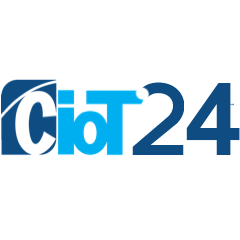CIoT 2024 Keynotes
Keynote #1
Title: Enabling Collaborative Intelligence at the Edge: A Spatial Computing Approach with JAMScript
Abstract: Edge AI reimagines the network’s edge as a continuously evolving learning environment, leveraging the diverse capabilities and data streams of devices such as drones, vehicles, wearables, and fixed sensors. By dynamically integrating resources and adapting to node availability and movement, the edge transforms into a collaborative space for intelligent decision-making, benefiting all connected devices and enabling innovative applications. Achieving this vision requires addressing several challenges, including managing decentralized learning, coordinating heterogeneous nodes, and safeguarding data integrity and privacy in a fluid network landscape. To meet these challenges, we propose a spatial computing approach to Edge AI programming that sustains intelligence within the edge environment, enabling devices to opportunistically engage with and enhance the shared knowledge base. This new paradigm is realized through JAMScript, a specialized programming language we are developing to support spatial computing for Edge AI.

Muthucumaru Maheswaran
(McGill University, Canada)
Bio: Muthucumaru Maheswaran is an associate professor in the School of Computer Science and Department of Electrical and Computer Engineering at McGill University. Previously, he was an assistant professor in the University of Manitoba and a Scientist at TRLabs, Winnipeg. He got a PhD in Electrical and Computer Engineering from Purdue University, West Lafayette, USA and a BSc in Electrical and Electronic Engineering from University of Peradeniya. He has researched various issues in mapping workloads onto Grids and utility computing (Cloud) systems such as task scheduling, trust management, resource discovery, and security. Many papers he co-authored in these topics have been highly cited by other researchers in this area. He has supervised the completion of 12 PhD theses and 40 MSc theses. He has published more than 130 technical papers in major journal, conferences, and workshops. He holds several US patents in wide-area content routing, synchronization, and task scheduling. Recently, his research has focused on the development of novel programming models and frameworks for edge-oriented Internet of Things and real-time AI applications at the edge. As part of this work, he is developed an open-source programming language called JAMScript and researching many issues including fault tolerance, scheduling, and synchronization within this framework
Keynote #2
Title: Advancing Cloud and IoT Security through LLMs, Federated and Deep Reinforcement Learning
Abstract: The rapid expansion of the Internet of Things (IoT) and cloud computing has revolutionized numerous industries by enhancing connectivity, automation, and data processing capabilities. However, this growth has also introduced significant security challenges, with IoT devices and cloud infrastructures becoming prime targets for cyberattacks. Recent developments in AI, particularly Large Language Models (LLMs), Federated Learning (FL) and Deep Reinforcement Learning (DRL), present innovative solutions to bolster IoT and cloud security. This talk explores the integration of LLMs and DRL to enhance many security aspects such as communication security, intrusion detection, incident response, forensic investigation as well as enforcing security by design in IoT and cloud environments.
Large Language Models (LLMs) exploit their advanced natural language processing capabilities to scrutinize extensive datasets, thereby identifying anomalies and forecasting potential threats. Simultaneously, Deep Reinforcement Learning (DRL) algorithms enhance security protocols through ongoing learning and adaptation to the evolving threat landscape. The Talk will highlight the synergistic potential of integrating LLMs, FL and DRL to deliver robust, distributed, and real-time security monitoring and automated mitigation strategies. The Integration and orchestration of these approaches could constitute a proactive defence mechanism, markedly enhancing the resilience of IoT and cloud infrastructures against cyberattacks. The talk will also discuss future research directions notably refining these AI models for heightened accuracy and redefining cybersecurity paradigms for IoT and cloud computing.

Mohamed Chahine Ghanem
(Associate Professor in Cyber Security & AI | Director (Acting) Cyber Security Center | Senior Fellow University of Liverpool, UK)
Bio: Dr Mohamed Chahine Ghanem is Principal Consultant (Industry) an Associate Professor (Academia) in Cyber Security and Applied AI, he serves as Director of the Cyber Security Research Centre at London Metropolitan University and is Senior Academic in Cyber Security at the University of Liverpool (UK). Before joining Academia, Dr Ghanem earned solid expertise with over 15 years of practice at mid-senior and senior positions within law-enforcement and corporations mainly acting as Principal Investigator and Lead Cyber Risk Auditor. Dr Ghanem holds an Engineering Degree in Computer Science, an MSc in Digital Forensics & IT Security and a PhD in Cyber Security Engineering from the City, University of London. Over the years, Dr Ghanem earned many reputable certificates and credentials such as CISSP, CPCI, multiple GIAC certifcates. Dr Ghanem is currently leading research project aiming to apply AI in digital forensics, IoT, defensive & offensive cyber security.
Keynote #3
Title: IoT Device Performance in a Non-Reciprocal Wireless Network
Abstract: A breakthrough in wireless networking for IoT devices—the LATYS FOCUS solution. This keynote will tackle a critical challenge facing IoT devices in wireless networks: the power mismatch problem. In such networks, imbalanced power between the source and IoT devices often leads to missed connections, dropped packets, high retry rates, and overall poor network performance.LATYS FOCUS introduces a cutting-edge approach that brings balance to these uneven links, enhancing device performance and optimizing energy use. Attendees can expect exciting insights, real-world case studies, and evidence of significant improvements in connectivity, speed, and reliability across diverse IoT applications.

Artmiz Golkaramnay
(Founder, Product & Business Lead at LATYS, Canada )
Bio: Artmiz Golkaramnay is the founder of LATYS Intelligence Inc, a Montreal-based wireless networking company. She earned her BS in Electrical and Computer Engineering at Norwich University (Vermont, USA) and her MASc in Electrical and Computer Engineering at Concordia University (Montreal, Canada).
Artmiz’s initial research had been focused in diverse areas of circuit design, cryptography, and mathematics. Her latest research was focused on improving 5G mmWave networks using Reinforcement Learning techniques.
With her love for engineering and passion for the wireless communication industry, she has contributed to several professional organizations in different capacities, such as Society of Women Engineers (SWE), IEEE, and Tau Beta Pi (TBP).
Artmiz brings her research, leadership, and problem-solving experience to guide LATYS in building future-proof product solutions.







